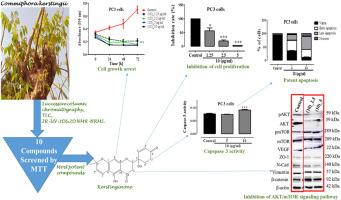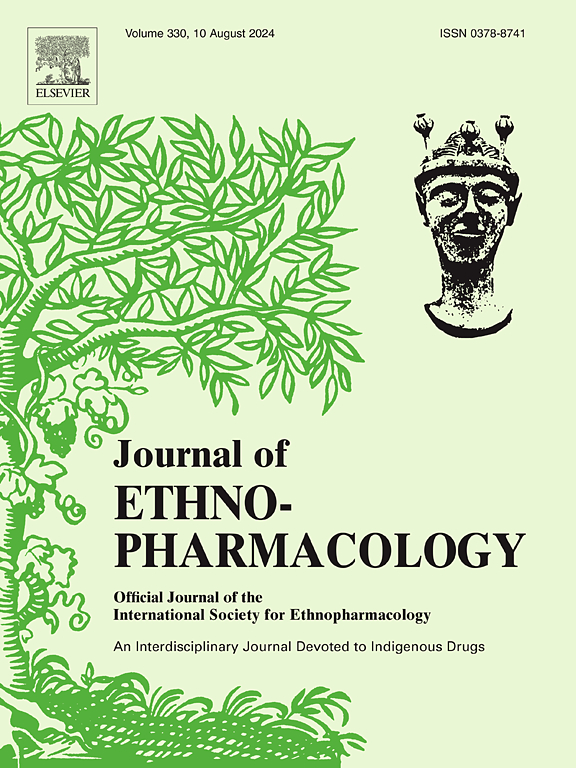Kerstinginone, a new flavanone derivative from Commiphora kerstingii Engl. (Burseraceae) with potent apoptosis-inducing activity and inhibition of AKT/mTOR signaling pathway in non-sensitive prostate cancer cells
IF 5.4
2区 医学
Q1 CHEMISTRY, MEDICINAL
引用次数: 0
Abstract
Ethnopharmacological relevance
Commiphora kerstingii Engl is a tree which is 20–30 m in height and commonly called “ararrabi” in Hausa. It is found in the Sahelian region (Cameroon, Chad, and Nigeria) where it is utilized for the treatment of several ailments including cancer.
Aim of the study
This study was aimed at investigating the chemical constituents and cytotoxic effect of extracts and isolates from the stem barks and leaves of C. kerstingii.
Materials and methods
Using classical chromatography technique coupled with spectroscopic analysis and literature information, ten (10) compounds were isolated from C. kerstingii stem barks and leaves, out of which two [kerstingilactone (3) and kerstinginone (10)] were new. To evaluate their potential cytotoxic effect, the impact on cell viability, growth, and proliferation was assessed using MTT and CCK-8 assays. Cell death mechanisms were analyzed via flow cytometry, and Western blotting was utilized to examine the expression of specific regulatory proteins. Furthermore, anti-metastatic properties were investigated through assays on cell migration, adhesion, and chemotaxis.
Results
Among the tested compounds, 2 (Masticadienonic Acid) and 10 (kerstinginone) exhibited significant dose-dependent inhibition of PC3 and LNCaP cell growth. Compound 2 displayed optimal inhibitory effects within a concentration range of 10–40 μg/mL, while compound 10 demonstrated potent growth inhibition at concentrations of 2.5–10 μg/mL. Both compounds suppressed cell proliferation and the formation of clones. Specifically, compound 2 induced apoptosis solely in the androgen-sensitive LNCaP prostate cancer cells, whereas compound 10 induced a stronger and concentration-dependent apoptotic response in both PC3 and LNCaP cells, resulting in approximately 50–70% apoptotic cells. It also induced potent cell migration/invasion arrest at concentrations ranging from 2.5 to 5 μg/mL and increased cell adhesion to the extracellular matrix.
Conclusion
Kerstinginone exhibits potent cytotoxicity and apoptosis-inducing activity, making it a promising lead for discovering a new anticancer drug.

Kerstinginone 是一种新的黄烷酮衍生物,产自康美拉(Commiphora kerstingii Engl.)(Burseraceae),在非敏感性前列腺癌细胞中具有强大的凋亡诱导活性和 AKT/mTOR 信号通路抑制作用。
民族药理学意义:Commiphora kerstingii Engl 是一种树,高 20-30 米,在豪萨语中通常被称为 "ararrabi"。它分布在萨赫勒地区(喀麦隆、乍得和尼日利亚),可用于治疗包括癌症在内的多种疾病:本研究旨在调查 C. kerstingii 茎皮和叶中提取物和分离物的化学成分和细胞毒性作用:采用经典色谱技术,结合光谱分析和文献信息,从 C. kerstingii 茎皮和叶中分离出十(10)种化合物,其中两种 [kerstingilactone (3) 和 kerstinginone (10)]是新化合物。为了评估它们潜在的细胞毒性作用,使用 MTT 和 CCK-8 试验评估了它们对细胞活力、生长和增殖的影响。通过流式细胞术分析了细胞死亡机制,并利用 Western 印迹法检测了特定调控蛋白的表达。此外,还通过细胞迁移、粘附和趋化试验研究了抗转移特性:在测试的化合物中,2(Masticadienonic Acid)和 10(kerstinginone)对 PC3 和 LNCaP 细胞的生长具有显著的剂量依赖性抑制作用。化合物 2 在 10 至 40 μg/mL 的浓度范围内显示出最佳抑制效果,而化合物 10 在 2.5-10 μg/mL 的浓度范围内显示出有效的生长抑制作用。这两种化合物都能抑制细胞增殖和克隆的形成。具体来说,化合物 2 只诱导对雄激素敏感的 LNCaP 前列腺癌细胞凋亡,而化合物 10 则诱导 PC3 和 LNCaP 细胞产生更强的浓度依赖性凋亡反应,导致约 50-70% 的细胞凋亡。在 2.5 至 5 μg/ml 的浓度范围内,它还能有效阻止细胞迁移/侵袭,并增加细胞与细胞外基质的粘附性:结论:Kerstinginone 具有很强的细胞毒性和细胞凋亡诱导活性,是一种很有前景的抗癌新药。
本文章由计算机程序翻译,如有差异,请以英文原文为准。
求助全文
约1分钟内获得全文
求助全文
来源期刊

Journal of ethnopharmacology
医学-全科医学与补充医学
CiteScore
10.30
自引率
5.60%
发文量
967
审稿时长
77 days
期刊介绍:
The Journal of Ethnopharmacology is dedicated to the exchange of information and understandings about people''s use of plants, fungi, animals, microorganisms and minerals and their biological and pharmacological effects based on the principles established through international conventions. Early people confronted with illness and disease, discovered a wealth of useful therapeutic agents in the plant and animal kingdoms. The empirical knowledge of these medicinal substances and their toxic potential was passed on by oral tradition and sometimes recorded in herbals and other texts on materia medica. Many valuable drugs of today (e.g., atropine, ephedrine, tubocurarine, digoxin, reserpine) came into use through the study of indigenous remedies. Chemists continue to use plant-derived drugs (e.g., morphine, taxol, physostigmine, quinidine, emetine) as prototypes in their attempts to develop more effective and less toxic medicinals.
 求助内容:
求助内容: 应助结果提醒方式:
应助结果提醒方式:


